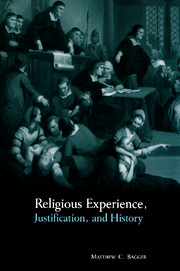Book contents
- Frontmatter
- Contents
- Acknowledgments
- List of abbreviations
- Chapter 1 Introduction: spectral evidences
- Chapter 2 The explanation in experience and the explanation of experience
- Chapter 3 Justification by reasons alone
- Chapter 4 Perennialism revisited
- Chapter 5 The miracle of minimal foundationalism
- Chapter 6 Loves noble Historie: Teresa of Avila's mystical theology
- Chapter 7 Modernity and its discontents
- Bibliography
- Index
Chapter 2 - The explanation in experience and the explanation of experience
Published online by Cambridge University Press: 22 September 2009
- Frontmatter
- Contents
- Acknowledgments
- List of abbreviations
- Chapter 1 Introduction: spectral evidences
- Chapter 2 The explanation in experience and the explanation of experience
- Chapter 3 Justification by reasons alone
- Chapter 4 Perennialism revisited
- Chapter 5 The miracle of minimal foundationalism
- Chapter 6 Loves noble Historie: Teresa of Avila's mystical theology
- Chapter 7 Modernity and its discontents
- Bibliography
- Index
Summary
Among the topics dominating the modern philosophical agenda the nature of experience has figured as prominently as any. Questions regarding the status of knowledge claims based on different sorts of experience have occupied philosophy since at least the early seventeenth century. Modern philosophers have continually looked to perceptual experience or the experience of self-consciousness to ground knowledge claims. Roughly, empiricists wish to ground knowledge in the deliverances of perceptual experience and some so-called rationalists and idealists seek to ground knowledge in the experience of self-consciousness and/or the experience of conviction. Increasingly, historians of philosophy recognize the poverty of schematic empiricist/rationalist or empiricist/idealist dichotomies, but we can safely assert that different philosophers and traditions within the course of modern philosophy have sought to ground knowledge by placing varying emphasis on these types of experience. Logical empiricism, for instance, attempted to correlate bits of perceptual experience to propositions. This project runs into trouble, however, when one accounts for the influence of beliefs and language on experience. If our beliefs, language, and expectations influence our experiences, then a vicious circularity ensues if we use those experiences to ground our beliefs.
The same dynamic operates in the philosophy of religious experience. The modern interest in religious experiences derives largely from an ambition to ground religious beliefs autonomously in the experience of the believer. Mirroring the moves made in epistemology, religious thinkers have variously compared the grounding religious experience to either the experience of self-consciousness or perceptual experience.
- Type
- Chapter
- Information
- Religious Experience, Justification, and History , pp. 21 - 57Publisher: Cambridge University PressPrint publication year: 1999



